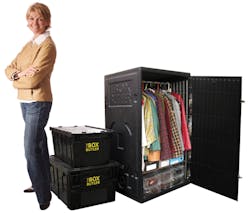New Jersey Bolsters Entrepreneurs Creating Urban Growth
New Jersey has its eye on a certain type of entrepreneur.
“We are trying to identify entrepreneurs who can operate profitably in urban environments and also want to make an impact on the community at the same time,” explains Lyneir Richardson the director of the Center for Urban Entrepreneurship & Economic Development (CUEED) at Rutgers University. CUEED is a research-driven, teaching and practitioner-oriented urban entrepreneurship and economic development program, based at the Rutgers Business School.
While that seems to be a tall order, there is actually a large supply of these business owners in the area. In fact one of CUEED's programs, the Entrepreneurship Pioneers Initiative, receives 100-150 applications and can only accommodate 25-30.
CUEED, which is the first of its kind in the country, integrates scholarly work with private capital, government, and non-profit sectors to develop citywide resources. From a curriculum perspective practical solutions stem from the university’s ongoing research on socioeconomic development and entrepreneurship in the degree and community programs.
EPI, referred to as Business Boot Camp by the alumni, offers monthly half-day sessions which explore topics including: customer management, marketing, finance, strategic management, business valuation and innovation.
And the graduates are thriving. Since the launch of the program seven years ago 170 graduates have created companies that hire local talent. The companies run the gamut from manufacturing, apparel, retail, cottage food and even personal services.
One young entrepreneur, a manufacturer of clothing items, is an undergraduate at the business school, pursuing a minor in entrepreneurship, and has relied heavily on the lessons he is learning while at Rutgers. “Since the company was started by four best friends while still in school, we have divided the work based on the tenets we learned at the Rutgers program,” explains Dean Flamio, vice president sales of Qilo. "Each of the four partners chose internships in different disciplines so that the company knowledge was well rounded.”
The company began as a blog written by Rutgers design student Jarrell Chalmers which featured T-shirts. Demand was so high for these shirts that he sought investment, provided by friend and co-founder Michael Stein, and thus created a company adding Dean and Alexander Babatunde.
While the company found that it was too expensive to manufacture in the U.S. at its beginning, this Fall it will manufacture certain clothing items in New York.
The popularity of their first product, the pineapple camp cap, is attracting celebrities' attention. In fact recently it was voted one of the coolest brands on Instagram. (The company’s big break came when Jarrell was walking around New York City wearing the hat and an admirer of the hat connected him to Tumbler.)
Lessons learned at the Rutgers program have been integral to the company’s success says Flamio. “The number one thing I took from the program is that an idea will work with an A team. We divide the work among us, as we are still students and have internships, and we trust each other completely.”
The company, which made it through a number of rounds on Shark Tank, drew strategies from classes to charter its growth moving from a single item to a variety of items and styles.
Teaching Strategy Creates Success
Another success story is that of Lilia Rios who is a graduate of the EPI program and owner of La Providencia. She and her husband moved from Mexico to New Jersey after market research showed that the Hispanic area was underserved in specialty cookware and supplies.
When an alumnus of the EPI program reached out to them and suggested enrolling in the program they were happy for the opportunity to learn strategies on how to build their business through diversifying both their customer base and their products.
The company continued to get support from economic development organizations, both county and city, in the form of loans for their building. They manufacture in New Jersey and China but most of the products come from artisans in Mexico.
Their mission to “import tradition and sell culture” has propelled the company into becoming a leader in the Hispanic market (across the country) within the categories of kitchenware, cleaning and party supplies. The company also has products in beauty supplies, arts and crafts and candies.
“With operations nationally, and in Canada, our goal is to further expand to be present in supermarkets in every state,” says Lilia. To achieve this goal might involve a route that many entrepreneurs take which is selling the company to a larger company to fuel growth.
One graduate of the EPI program did in fact recently sell his company to a large public company. The company, called Box Butler, follows the classic story of seeing a need, filling it and then finding a larger buyer in order to expand nationally.
Of course many years and a lot of work go into that success story. Scott Sinclair, creator of Box Butler, was living in New York city and after a bad storm saw his neighbor taking her soggy boxes from the basement up to her apartment and felt that there had to be a better way.
He left his corporate job and created the company that delivers boxes to a resident and picks them up and safely stores them after the resident has packed them up. His warehouse space is in Hackensack, N.J.
A year and a half after he started the business he got a call from the EPI program. The program's financing assistance was of particular help to Sinclair as EPI helped him obtain a large microloan and also stepped in with financial help a few years later when his business was really growing and needed capital to continue.
“What I found most valuable about the EPI program was the relationships I established,” says Sinclair. “They have assisted me throughout the years.”
And Sinclair is especially happy about his ability to add jobs to the area. “I was able to tap into the talent pool of New Jersey and the local metro area and I’m proud to be part of the growth of this area,” says Sinclair.
Continued growth in the area is based on continued innovation, according to Richardson. “Small businesses are our bread and butter,” explains Richardson. “We need to help business owners create profitable, healthy and sustainable businesses.” The economic impact of these small businesses is currently $35 million per year and Richardson aims to reach a $100 million impact.



